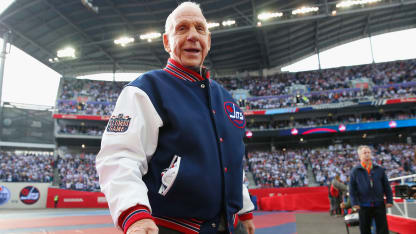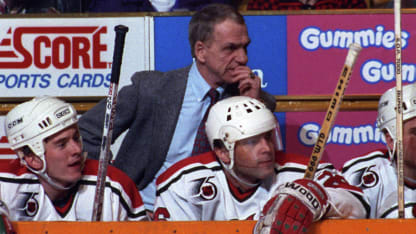Tom McVie, a Boston Bruins ambassador who coached the New Jersey Devils, Washington Capitals and Winnipeg Jets, died at the age of 89.
"The entire Boston Bruins organization is deeply saddened to learn of the passing of Tom McVie," Bruins president Cam Neely said in a statement Monday. "Tom was a huge part of our Bruins family, having served as coach, scout and ambassador for more than 30 years. His hockey mind, colorful personality, gruff voice, and unmatched sense of humor livened up every room he entered, and he will be dearly missed. Our thoughts and prayers are with Tom's family and many loved ones."
Born June 6, 1935, in Trail, British Columbia, McVie began his NHL coaching career with the Capitals on Dec. 31, 1975. He coached two more seasons in Washington and guided the Jets of the World Hockey Association to the 1979 Avco Cup before taking over for Bill Sutherland in Winnipeg's first two NHL seasons (1979-80, 1980-81).
McVie became the second Devils coach after the franchise relocated from Denver in 1982 when he replaced Billy MacMillan after New Jersey started the 1983-84 season 2-18 with zero ties. He went 15-38 with seven ties in 60 games and returned to replace John Cunniff 67 games into the 1990-91 season.
The Devils made the Stanley Cup Playoffs the following season, losing the Patrick Division Semifinals in seven games to the New York Rangers. McVie was replaced by Herb Brooks and hired as a Bruins assistant to Brian Sutter for the 1992-93 season, when Boston went 51-26 with seven ties but was swept by the Buffalo Sabres in the best-of-7 Adams Division Semifinals.
McVie was 126-263 with 73 ties in 462 regular-season games and got his name on the Stanley Cup in 2011 as a Bruins ambassador. Though he never reached the NHL as a player, he skated 21 seasons in the minor leagues as a left wing, including one as a player-coach for Fort Wayne in the International Hockey League in 1971-72 and the following season with Johnston of the Eastern Hockey League.


















